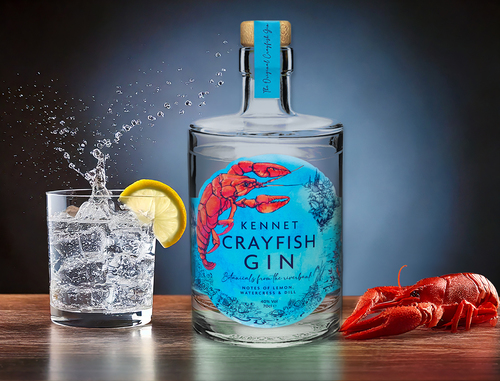Running a small business requires perseverance, resilience and luck: A Crayfish Company’s Journey
Andrew Leech started a co-operative business with his brother and some fellow crayfish trappers which became very successful until the law changed and suddenly it wasn’t. So he found a way to trade within the new law but it wasn’t easy.
The law says stop catching crayfish
It all started with a barbecue in the garden on the river Lambourn which is a tributary of the River Kennet, a clear, shallow river in which could be seen many a trout. A friend at the BBQ threw a chicken bone into the water and it was mobbed by what looked like small lobsters. Andrew Leech was instantly hooked.
Research told Andrew that the ‘mob’ were American signal crayfish, imported in the 1970s to farm for the Scandinavian market, where they were much in demand. The crayfish had escaped from the farms and thrived in the wild. Andrew is a design engineer so he designed a crayfish trap as a variant on a lobster pot and soon he, his brother and a few local crayfish trappers were exporting a couple of tons of crayfish a week to the Baltic States. To support this trade the fishermen had built holding tanks, again designed by Andrew, where the crayfish could be accumulated and purged. It was hard work but supported the overheads and kept the local crayfish population down. Until that is, when new laws were introduced to protect native crayfish, other river dwellers and the environment – signal crayfish were named an invasive species. They carry a virus to which native breeds have no defence, they are voracious predators, eating the eggs and young of fish, impacting on the lives of waterfowl and all natural river invertebrates. Also, the crayfish tunnel, up to three feet, into riverbanks causing their collapse. The transport of live crayfish was banned in the UK and most of Europe, plus their capture and processing was now subject to stringent controls. Andrew and colleagues were pretty much out of business.
Investment solves a lot of problems
To continue in the crayfish business Andrew found there were several challenges: it would require a bio-secure processing plant, where the crayfish would need to be humanely killed, at least par cooked or fully cooked and chilled. A clutch of licenses would be required to cover capture, transport, processing and extraction of water from the River Kennet. This would all require substantial investment. The resulting product, par cooked would not have sufficient shelf-life to allow for shipping to Scandinavia. Fully cooked and packaged could have the shelf life but would be expensive to deliver with the difficulties of exporting since Brexit. There was almost no established market in the UK, where limited demand was being met by inferior farmed, frozen crayfish imported from China. Plans were put on hold pending finding an investor.
A few years later Andrew found a backer, a former client of his design engineering business, Businesses for JHB, so he designed and built a bio-secure plant with enough capacity for a profitable business and set about processing and selling chilled par-cooked wild crayfish with a shelf-life of 48 hours. He also found a Swedish packaging system that would enable The Kennet Crayfish Company Limited to offer vacuum packed cooked crayfish with a fridge shelf-life of up to 21 days in brine or Swedish style using a salty dill liquor. Word quickly started to spread through the expatriate communities of Scandinavians and Eastern Europeans in the UK and the crayfish started developing a market in the restaurant and hospitality sector. But not enough business or fast enough growth.
How do you grow a business?
Andrew and his team acknowledged that they would have to invest in a strategic and consistent marketing activity to boost sales and create a broader awareness of the delights of this wild caught crayfish. This resulted in a number of PR wins including coverage on BBC regional radio and TV, local newspapers and national magazines and the internet. They also entered The BBC Food and Farming Awards 2024 where Kennet Crayfish were selected as one of three finalists in the prestigious top category "Food Producer of the Year”. Other initiatives include a partnership with Larkshead Licensing, a brand licensing agent to look at spin off opportunities.
Diversify into new markets
The next phase of Kennet Crayfish Company’s development was to diversify by looking at ways of developing new food products using the crayfish shells and meat to produce a range of signature culinary items. The fist being the recent launch of a wonderful premium craft crayfish gin. This was conceived by talking to various professionals in the drinks trade which encouraged Andrew to explore this further. He then had a chat with a nearby craft distillery, Hawkridge Distillers, who created the final product over numerous distillations, macerating and infusing the complimentary botanicals. The premium gin blend result is fresh on the nose, sweet on the palate and delivers a beautiful citrus and herbaceous complexity.
What next for the wonderful crayfish?
Kennet Crayfish Company is also in the process of developing a crayfish bisque, stock and butter which are already generating interest. Andrew Leech says: “We are not safe yet as we need to generate more crayfish sales to the hospitality sector, as well as keep building our base of direct sales to consumers. Our mission is to convert far more of the British public to the wonders of this delicious crayfish and to our extended range of culinary produce.”
Leech adds: “In addition, we are also, investing in solutions to improve our packaging to make them more recyclable, compostable and eco-friendly in turn also trying to increase the product shelf-life.”
(https://www.kennetcrayfish.com/)
Ends
Contact Julia Vockrodt VP Communications. julia@vp-pr.com 07710942743
